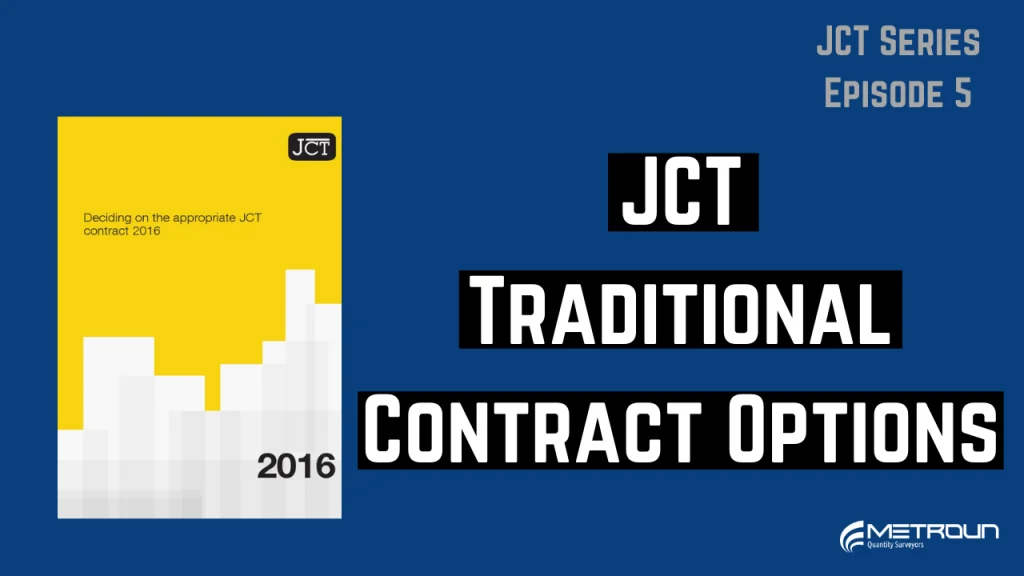The most recent version of the JCT suite of contracts is 2016. This takes account of the changes to the revision of the interim payment regime, the introduction of the common valuation date and to certain insurance provisions. However, previous editions of the JCT are still in use.
The traditional contracts are still, by far, the most used JCT contracts and we will cover each of them in this article.

Traditional or Conventional: Lump Sum Contracts
The Standard Building Contract with Quantities and The Standard Building Contract without Quantities.
Both prices are based on lump sum with monthly interim payments unless otherwise stated.
The main difference for the contract with quantities is that the Employer will go through his professional consultants to provide a set of drawings and bills of quantities which specify the works in terms of quality and quantity.
This contract is most appropriate for larger works designed and detailed by or on behalf of the Employer.
The Intermediate Building Contract and The Intermediate Building Contract with contractor’s design
Prices are also based on lump sum with monthly interim payments. Provisions are included relating to BIM and for collaborative working, sustainability, advance payment and a bond for the payment of off-site materials, a performance bond and parent company guarantee and for collateral warranties.
The only difference between the two contracts is that the latter provides for a Contractor’s Designed Portion
The contract is most appropriate for where the proposed building works are of simple content involving the normal, recognised basic trades and skills of the industry.
The Minor Works Building Contract and The Minor Works Building Contract with contractor’s design.
The prices are based on lump sum with monthly interim payments. This contract requires the
Employer through his professional consultants, to provide drawings and/or a specification and/or work schedules to describe the Works.
The contract is most appropriate for where the work involved is simple in character and where the work is designed by or on behalf of the employer.
The Repair and Maintenance Contract (Commercial)
This contract is flexible in terms of price in that it enables the Employer to seek quotes on the basis of a fixed price or of daywork or other rates. You could be using either a Schedule of Rates or all-in labour rates in a Schedule of Hourly Charges.
This contract is intended for use on individual, substantially defined, programmes of repair and/or maintenance work on specified buildings or sites.
The contract is most appropriate for where the work involves the repair and maintenance of a building.
Building contract for a home owner/occupier
Price is based on a lump sum and the accepted quotation from the contractor. The price is to be inclusive of any VAT. There is provision for a single payment on completion, or if agreed, payment by instalments.
The contract is based on drawings and/or a specification.
This contract is most appropriate for small domestic building work such as extensions and alterations
Home Repair and Maintenance Contract
Price may be a lump sum or based on an hourly rate plus the contractor’s invoices for materials. The price is to be inclusive of any VAT.
This contract is most appropriate for small-scale repairs and maintenance of a straightforward nature to domestic buildings
Traditional or conventional: Measurement Contracts
Standard Building Contract With Approximate Quantities
Price is based on the tender figure which is converted to an Ascertained Final Sum on remeasurement and valuation of all work. Interim payments are monthly unless otherwise stated. Detailed contract provisions are necessary.
The Employer is to provide the Contractor with drawings; and with approximate bills of quantities to define the quantity and quality of the work, which are all subject to remeasurement. This is due to insufficient time to prepare the detailed drawings necessary for an accurate bills of quantities.
This contract is most appropriate for larger works designed or detailed by or on behalf of the Employer.
Measured Term Contract
This contract is based on a priced Schedule of Rates to be followed by a series of Orders for each separate item of work which might include a written description and drawings where relevant.
The Measured Term Contract requires the Employer to
· list the properties to be covered by the contract and state the period and the type of work which may be required from time to time during that period
· estimate the total annual value of the work for the whole contract period
This contract is most appropriate for Employers who have a regular flow of maintenance and minor works, including improvements, to be carried out by a single contractor over a specified period of time and under a single contract.
Traditional or conventional: Cost reimbursement or cost plus contracts
Prime Cost Building Contract
The Contractor is paid the Prime Cost of the Works, as certified by the Architect/Contract Administrator. The Employer also pays a Contract Fee in respect of the Contractor’s non-site overheads and profit.
This contract is most often used for alteration work and for urgent repair work (e.g. after fire damage) where an early start is necessary, and the exact nature and extent of the Works cannot be determined until the work is actually under way.
This contract is most appropriate for projects requiring an early start on site, where the works are designed by or on behalf of the Employer but where it is not possible to prepare full design information before the works commence.
Format & Structure
It would also be wise to show you the format and structure of a JCT contract. The standard format is;
· Articles of Agreement
· Contract Particulars: these contain project-specific information
· Conditions of Contract; and
· Schedules.
With the main sections consisting of
· definitions
· carrying out the works
· control of the works;
· payment
· variations
· injury, damage and insurance
· assignment, third party rights and collateral warranties
· termination and
· settlement of disputes
Watch our video on The JCT Management Contract here:
How we can help
Here at Metroun we can offer you commercial support when working on a construction project. We can tailor the support to suit your needs. Want to be commercial independent? We can provide industry ready templates. Require a full-time QS? We can provide you with highly skilled Quantity Surveyors to manage the commercial aspect on your projects. Need some extra support? We can provide you with guidance and support as and when you need.







